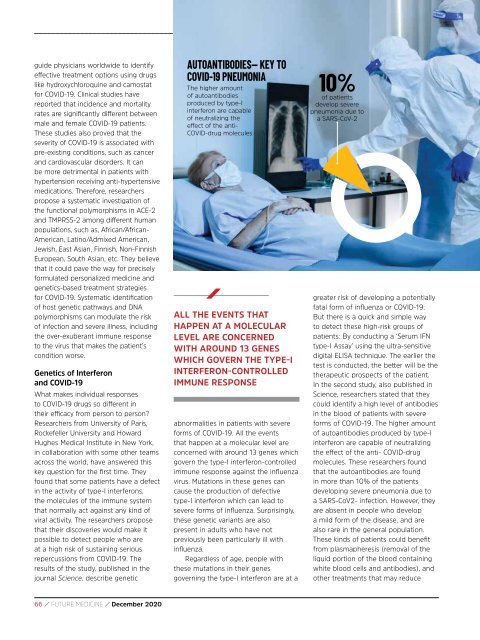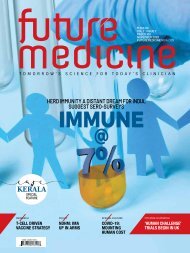Create successful ePaper yourself
Turn your PDF publications into a flip-book with our unique Google optimized e-Paper software.
guide physicians worldwide to identify<br />
effective treatment options using drugs<br />
like hydroxychloroquine and camostat<br />
for COVID-19. Clinical studies have<br />
reported that incidence and mortality<br />
rates are significantly different between<br />
male and female COVID-19 patients.<br />
These studies also proved that the<br />
severity of COVID-19 is associated with<br />
pre-existing conditions, such as cancer<br />
and cardiovascular disorders. It can<br />
be more detrimental in patients with<br />
hypertension receiving anti-hypertensive<br />
medications. Therefore, researchers<br />
propose a systematic investigation of<br />
the functional polymorphisms in ACE-2<br />
and TMPRSS-2 among different human<br />
populations, such as, African/African-<br />
American, Latino/Admixed American,<br />
Jewish, East Asian, Finnish, Non-Finnish<br />
European, South Asian, etc. They believe<br />
that it could pave the way for precisely<br />
formulated personalized medicine and<br />
genetics-based treatment strategies<br />
for COVID-19. Systematic identification<br />
of host genetic pathways and DNA<br />
polymorphisms can modulate the risk<br />
of infection and severe illness, including<br />
the over-exuberant immune response<br />
to the virus that makes the patient’s<br />
condition worse.<br />
Genetics of Interferon<br />
and COVID-19<br />
What makes individual responses<br />
to COVID-19 drugs so different in<br />
their efficacy from person to person?<br />
Researchers from University of Paris,<br />
Rockefeller University and Howard<br />
Hughes Medical Institute in New York,<br />
in collaboration with some other teams<br />
across the world, have answered this<br />
key question for the first time. They<br />
found that some patients have a defect<br />
in the activity of type-I interferons,<br />
the molecules of the immune system<br />
that normally act against any kind of<br />
viral activity. The researchers propose<br />
that their discoveries would make it<br />
possible to detect people who are<br />
at a high risk of sustaining serious<br />
repercussions from COVID-19. The<br />
results of the study, published in the<br />
journal Science, describe genetic<br />
AUTOANTIBODIES— KEY TO<br />
COVID-19 PNEUMONIA<br />
The higher amount<br />
of autoantibodies<br />
produced by type-I<br />
interferon are capable<br />
of neutralizing the<br />
effect of the anti-<br />
COVID-drug molecules<br />
ALL THE EVENTS THAT<br />
HAPPEN AT A MOLECULAR<br />
LEVEL ARE CONCERNED<br />
WITH AROUND 13 GENES<br />
WHICH GOVERN THE TYPE-I<br />
INTERFERON-CONTROLLED<br />
IMMUNE RESPONSE<br />
abnormalities in patients with severe<br />
forms of COVID-19. All the events<br />
that happen at a molecular level are<br />
concerned with around 13 genes which<br />
govern the type-I interferon-controlled<br />
immune response against the influenza<br />
virus. Mutations in these genes can<br />
cause the production of defective<br />
type-I interferon which can lead to<br />
severe forms of influenza. Surprisingly,<br />
these genetic variants are also<br />
present in adults who have not<br />
previously been particularly ill with<br />
influenza.<br />
Regardless of age, people with<br />
these mutations in their genes<br />
governing the type-I interferon are at a<br />
10%<br />
of patients<br />
develop severe<br />
pneumonia due to<br />
a SARS-CoV-2<br />
greater risk of developing a potentially<br />
fatal form of influenza or COVID-19.<br />
But there is a quick and simple way<br />
to detect these high-risk groups of<br />
patients: By conducting a ‘Serum IFN<br />
type-I Assay’ using the ultra-sensitive<br />
<strong>digital</strong> ELISA technique. The earlier the<br />
test is conducted, the better will be the<br />
therapeutic prospects of the patient.<br />
In the second study, also published in<br />
Science, researchers stated that they<br />
could identify a high level of antibodies<br />
in the blood of patients with severe<br />
forms of COVID-19. The higher amount<br />
of autoantibodies produced by type-I<br />
interferon are capable of neutralizing<br />
the effect of the anti- COVID-drug<br />
molecules. These researchers found<br />
that the autoantibodies are found<br />
in more than 10% of the patients<br />
developing severe pneumonia due to<br />
a SARS-CoV2- infection. However, they<br />
are absent in people who develop<br />
a mild form of the disease, and are<br />
also rare in the general population.<br />
These kinds of patients could benefit<br />
from plasmapheresis (removal of the<br />
liquid portion of the blood containing<br />
white blood cells and antibodies), and<br />
other treatments that may reduce<br />
66 / FUTURE MEDICINE / <strong>December</strong> <strong>2020</strong>

















